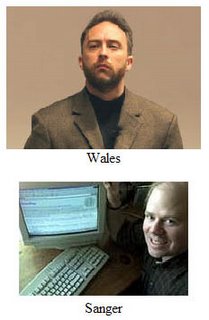Is Google Evil?
Is Google Evil?

Internet privacy?
Google already knows more about you than the National Security Agency ever will. And don’t assume for a minute it can keep a secret. YouTube fans--and everybody else--beware.by Adam L. Penenberg - October 10, 2006
Google Larry Page and Sergey Brin, the two former Stanford geeks who founded
the company that has become synonymous with Internet searching, and you’ll
find more than a million entries each. But amid the inevitable dump of press
clippings, corporate bios, and conference appearances, there’s very little
about Page’s and Brin’s personal lives; it’s as if the pair had
known all along that Google would change the way we acquire information, and had
carefully insulated their lives—putting their homes under other
people’s names, choosing unlisted numbers, abstaining from posting anything
personal on web pages.
That obsession with privacy may explain Google’s puzzling reaction last
year, when Elinor Mills, a reporter with the tech news service cnet, ran a search
on Google ceo Eric Schmidt and published the results: Schmidt lived with his wife
in Atherton, California, was worth about $1.5 billion, had dumped about $140
million in Google shares that year, was an amateur pilot, and had been to the
Burning Man festival. Google threw a fit, claimed that the information was a
security threat, and announced it was blacklisting cnet’s reporters for a
year. (The company eventually backed down.) It was a peculiar response,
especially given that the information Mills published was far less intimate than
the details easily found online on every one of us. But then, this is something
of a pattern with Google: When it comes to information, it knows what’s
best.
From the start, Google’s informal motto has been “Don’t Be
Evil,” and the company earned cred early on by going toe-to-toe with
Microsoft over desktop software and other issues. But make no mistake. Faced with
doing the right thing or doing what is in its best interests, Google has almost
always chosen expediency. In 2002, it removed links to an anti-Scientology site
after the Church of Scientology claimed copyright infringement. Scores of website
operators have complained that Google pulls ads if it discovers words on a page
that it apparently has flagged, although it will not say what those words are. In
September, Google handed over the records of some users of its social-networking
service, Orkut, to the Brazilian government, which was investigating alleged
racist, homophobic, and pornographic content.
Google’s stated mission may be to provide “unbiased, accurate, and
free access to information,” but that didn’t stop it from censoring
its Chinese search engine to gain access to a lucrative market (prompting Bill
Gates to crack that perhaps the motto should be “Do Less Evil”). Now
that the company is publicly traded, it has a legal responsibility to its
shareholders and bottom line that overrides any higher calling.
So the question is not whether Google will always do the right thing—it
hasn’t, and it won’t. It’s whether Google, with its insatiable
thirst for your personal data, has become the greatest threat to privacy ever
known, a vast informational honey pot that attracts hackers, crackers, online
thieves, and—perhaps most worrisome of all—a government intent on
finding convenient ways to spy on its own citizenry.
It doesn’t take a conspiracy theorist to worry about such a threat.
“I always thought it was fertile ground for the government to snoop,”
ceo Schmidt told a search engine conference in San Jose, California, in August.
While Google earned praise from civil libertarians earlier this year when it
resisted a Justice Department subpoena for millions of search queries in
connection with a child pornography case, don’t expect it will stand up to
the government every time: On its website, Google asserts that it “does
comply with valid legal process, such as search warrants, court orders, or
subpoenas seeking personal information.”
What’s at stake? Over the years, Google has collected a staggering amount
of data, and the company cheerfully admits that in nine years of operation, it
has never knowingly erased a single search query. It’s the biggest data
pack rat west of the nsa, and for good reason: 99 percent of its revenue comes
from selling ads that are specifically targeted to a user’s interests.
“Google’s entire value proposition is to figure out what people
want,” says Eric Goldman, a professor at Silicon Valley’s Santa Clara
School of Law and director of the High Tech Law Institute. “But to read our
minds, they need to know a lot about us.”
Every search engine gathers information about its users—primarily by
sending us “cookies,” or text files that track our online movements.
Most cookies expire within a few months or years. Google’s, though,
don’t expire until 2038. Until then, when you use the company’s
search engine or visit any of myriad affiliated sites, it will record what you
search for and when, which links you click on, which ads you access.
Google’s cookies can’t identify you by name, but they log your
computer’s IP address; by way of metaphor, Google doesn’t have your
driver’s license number, but it knows the license plate number of the car
you are driving. And search queries are windows into our souls, as 658,000 aol
users learned when their search profiles were mistakenly posted on the Internet:
Would user 1997374 have searched for information on better erections or
cunnilingus if he’d known that aol was recording every keystroke? Would
user 22155378 have keyed in “marijuana detox” over and over knowing
someone could play it all back for the world to see? If you’ve ever been
seized by a morbid curiosity after a night of hard drinking, a search engine
knows—and chances are it’s Google, which owns roughly half of the
entire search market and processes more than 3 billion queries a month.
And Google knows far more than that. If you are a Gmail user, Google stashes
copies of every email you send and receive. If you use any of its other
products—Google Maps, Froogle, Google Book Search, Google Earth, Google
Scholar, Talk, Images, Video, and News—it will keep track of which
directions you seek, which products you shop for, which phrases you research in a
book, which satellite photos and news stories you view, and on and on. Served up
à la carte, this is probably no big deal. Many websites stow snippets of
your data. The problem is that there’s nothing to prevent Google from
combining all of this information to create detailed dossiers on its customers,
something the company admits is possible in principle. Soon Google may even be
able to keep track of users in the real world: Its latest move is into free wifi,
which will require it to know your whereabouts (i.e., which router you are
closest to).
Google insists that it uses individual data only to provide targeted
advertising. But history shows that information seldom remains limited to the
purpose for which it was collected. Accordingly, some privacy advocates suggest
that Google and other search companies should stop hoarding user queries
altogether: Internet searches, argues Lillie Coney of the Electronic Privacy
Information Center, are part of your protected personal space just like your
physical home. In February, Rep. Edward Markey (D-Mass.) introduced legislation
to this effect, but Republicans have kept it stalled in committee. Google, which
only recently retained a lobbying firm in Washington, is among the tech companies
fighting the measure.
When I first contacted Google for this story, a company publicist insisted I
provide a list of detailed questions, in writing; when I said that I had a
problem with a source dictating the terms for an interview, he claimed that
everyone who covers Google—including the New York Times and the
Wall Street Journal—submits advance questions. (A Times
spokeswoman told me the paper sees no ethical problems with such a procedure,
though individual reporters’ decisions may vary; an editor in charge of
editorial standards at the Journal said the same thing.) The Google flack assured
me that this was so he could find the best person for me to talk to—more
information for Google, so that Google could better serve me.
Eventually he agreed to put me in touch, sans scripted questions, with Nicole
Wong, Google’s associate corporate counsel. I asked her if the company had
ever been subpoenaed for user records, and whether it had complied. She said yes,
but wouldn’t comment on how many times. Google’s website says that as
a matter of policy the company does “not publicly discuss the nature,
number or specifics of law enforcement requests.”
So can you trust Google only as far as you can trust the Bush administration?
“I don’t know,” Wong replied. “I’ve never been
asked that question before.”
Spooks at Google… and MySpace, PayPal, YouTube, Ebay, and Yahoo
Friday October 27th 2006, 2:36 pm

It comes as no surprise that Google is in bed with the CIA, or rather it is no
surprise the CIA ate Google and has turned it into yet another front company.
“A former clandestine services officer for the CIA who also maintains close
relationships with top Google representatives says that the company is ‘in
bed with’ the intelligence agency and the U.S. government,” writes Paul Joseph
Watson for Prison Planet.
Robert David Steele, the top-rated Amazon reviewer who recently admitted Webster G.
Tarpley’s 9/11 Synthetic Terror “is the strongest of the 770+
books” he has reviewed for the online bookseller—and thus he believes
there is enough evidence to have the Bush cabal do the perp walk in snazzy orange
jumpsuits—told Alex Jones he thinks “that Google has made a very
important strategic mistake in dealing with the secret elements of the U.S.
government—that is a huge mistake and I’m hoping they’ll work
their way out of it and basically cut that relationship off…. they were
heavily in bed with the Central Intelligence Agency, the office of research and
development…. If Google is indeed starting to do harm then I think
it’s important that be documented and publicized.”
Of course, ending a relationship with the CIA is akin to ending a relationship
considered vital to Don Corleone or the Stracci, Barzini, Cuneo, and Tattaglia
crime families. No doubt Eric Schmidt, former chief executive officer of Novell,
and current Google CEO harbors no desire to sleep with the fish.
I exaggerate, but only a little.
It is no exaggeration, however, to state that the CIA has fished around for top
drawer search technology for some time. Back in 2002, shortly after
“everything changed,” the CIA went shopping at Inktomi for
“search and retrieval technology,” according to Internet News.
Inktomi entered into a business relationship with In-Q-Tel, described as the
“venture capital arm of the American Central Intelligence Agency,”
that is to say a front company set-up to roll investment hungry technology
companies into the spook Borg Hive. According to Buzzy “Put
Options” Krongard, a onetime investment banker and former Executive
Director of the CIA, In-Q-Tel presented a “wonderful model… in
accessing the capabilities of the private sector,” that is to say snooping
and sleuthing by way of the private sector.
“Even while Google presents a public image of vigorously protecting its
users’ privacy, it has quietly provided assistance to several U.S.
intelligence agencies, such as the Central Intelligence Agency and Defense
Intelligence Agency, as the U.S. prosecutes its war on terrorism,” writes
Michael Hampton
for Homeland Stupidity. “In addition, Google may be providing assistance to
the National Security Agency.”
According to Hampton and IT professionals, the CIA is not simply interested in
the search capability of Google, but those of us who use that unparalleled
capability. “The intelligence community appears to be interested in data
mining Google’s vast store of information on each user who uses
Google’s services. Google collects data on each user’s search
queries, which web sites users visited after making a query, and through its
Google Analytics service, can also track users on cooperating web sites.
It’s not clear what level of access to or how much of this information has
been made available to intelligence agencies.” Hampton continues:
Hampton suggests blocking all Google cookies, but even “with cookies blocked, a limited amount of user tracking is possible, so unless you really are a terrorist, it probably isn’t worth the trouble.” Of course, as the CIA is responsible for creating a large share of what passes for terrorism, tracking terrorists through Google is not really necessary.The contractor, who spoke on a not-for-attribution basis, said that at least one US intelligence agency he declined to identify is working to “leverage Google’s [user] data monitoring” capability as part of an effort by the IC to glean from this data information of “national security intelligence interest” in the war on terror. . . .
One of the sources did say, however, that the CIA’s Office of Research and Development “has been giving them additional money and guidance and requirements.”
Last November, the CIA—through In-Q-Tel—issued notices to sell $2.2 million worth of Google stock.
Robert David Steele, intelligence veteran and CEO of OSS.Net, Inc. which sponsored last week’s event, told HSToday.us Tuesday evening that “Google is being actively hypocritical and deceptive in playing up its refusal to help the Department of Justice when all along it has been taking money and direction for elements of the US Intelligence Community, including the Office of Research and Development at the Central Intelligence Agency, In-Q-Tel, and in all probability, both the National Security Agency (NSA) and the Army’s Intelligence and Security Command.”
Steele added, “I have no doubt that Google, in its arrogance, decided it could make a deal with the devil and not get caught.”
In fact, they are interested in tracking and profiling you and me, not the dead Osama.
But if this does not make you paranoid enough, consider a post at Internet Portal Community Watch. Ebay is run by Richard T. Schlosberg III,
former graduate of the United States Air Force Academy. MySpace, of course, is now owned by Rupert Murdoch’s News Corporation. According to blogger Josh Smith, the “social networking” site Facebook is a data-gathering operation that received initial funding from Peter Thiel, who is connected to James Breyer, who is the former chairman of In-Q-Tel. Thiel is the co-founder of PayPal. Yahoo, the IPVW post asserts, is a possible “U.S. Military or psyOP Pentagon front.” Yahoo director Ed Kozel worked at Boeing, McDonnell Douglas, and SRI International. Chad Hurley, a former PayPal employee, is CEO and Co-Founder of YouTube. As we know, Google bought up YouTube, and Google’s connection to the CIA is less than speculative.
Finally, if you’re thinking about using Yahoo over Google, think again. Earlier this year, Michael Callahan, Yahoo’s senior vice president and general counsel, under “cross-examination during a congressional hearing … refused … to say whether the company opens its records for government surveillance [that is, the NSA] without a court order,” according to ZDNet. Although the NSA is supposedly restricted by its charter from “acquiring information concerning the domestic activities of United States persons,” it has done so habitually since its establishment on November 4, 1952. The NSA captures civilian telephone, fax, satellite, and data traffic through ECHELON. It runs “the largest database ever assembled in the world,” containing call detail records of all calls (domestic and international) placed through AT&T, Verizon and BellSouth.
Google Caught In Terror Storm Censorship
Viewing totals reset despite runaway popularity of Alex Jones video
Every time the ratings for "Terror Storm" place it among the "most watched" videos, Google "accidentally" erases the ratings.
Paul Joseph Watson & Alex Jones/Prison Planet.com | September 25 2006
Google is  again
embroiled in a censorship farce after its Google Video sub-division was caught
altering viewing statistics for Alex Jones' Terror Storm documentary, resetting
runaway growth curbs to prevent the video making the website's top ten and its
online viewership exploding exponentially.
again
embroiled in a censorship farce after its Google Video sub-division was caught
altering viewing statistics for Alex Jones' Terror Storm documentary, resetting
runaway growth curbs to prevent the video making the website's top ten and its
online viewership exploding exponentially.
Following last week's buzz about Terror Storm being available for viewing free
on Google Video, numerous websites linked to our promo page and as a result
viewing figures for all versions of Terror Storm at Google Video began to climb
rapidly.
However, upon checking the same viewer figures on Sunday, Alex Jones noticed
that many had been reset to zero and had only begun to climb into the hundreds
and early thousands, nowhere near their previous levels of tens and hundreds of
thousands for the previous days. The trends had been artificially reversed and
this prevented Terror Storm from entering the top ten list of Google Video which
would have ensured an explosion of further circulation of the video.
As you can see from the screenshot a reader e mailed us, Terror Storm was being
highlighted as one of Google Video's most popular selections and was heading for
the top ten, until late Saturday/early Sunday when viewership totals for the
video were inexplicably reset.
Is this another mistake on the part of Google or is it an attempt to minimize the impact of Terror Storm and prevent it from mirroring the same online presence as Loose Change?
This is not the first time we have caught Google engaging in censorship of Alex Jones and his websites.
During our Charlie Sheen coverage, Google intentionally blocked news stories pertaining to Sheen's comments which were first made on the Alex Jones Show and turned into a nationwide media spectacle.
Even after the story had gone supernova, and our original write-up had been linked all over the web, including the Drudge Report, Google's main search engine did not list the article.
After we blew the whistle on this act of censorship, the story was re-listed and Google even began carrying some of our content in their news section - a practice that has now also ceased.
Google's penchant for abandoning their founding principle of "don't be evil" and kissing up to Communist China for privileged access into the world's biggest untapped Internet market, was exemplified in February this when Google completely erased the Space War website from its search engine. Space War is a large mainstream news website that carries articles about geopolitics and the defense industry from AFP.
Space War speculated that it was their reporting on advancements in China's military technology and missile programs that provoked a censorship order from the totalitarian Chinese government which Google acted upon. Again, after a mass e mailing campaign which we fully supported, Google re-indexed the Space War website.
We hope that by drawing attention to this matter Google will remedy the artificial alteration, whether a result of technical gremlins or deliberate censorship, and enable an accurate and true reflection of the growth and popularity of Terror Storm.
Google Caught Censoring Charlie Sheen 9/11 Story

Quickly re-indexes pages during live radio discussion
Paul Joseph Watson & Alex Jones/Prison Planet.com | March 23 2006Note: Before you e-mail, please understand that we are aware of the fact that Google now carries links to Sheen 9/11 articles, that is not our point as you will read below. The censorship issue began before Google reversed their policy.
Google is again embroiled in a censorship scandal after being caught blocking
information about Charlie Sheen's 9/11
comments, despite the fact that every other major search engine had indexed
the pages.
For days, major search engines like Yahoo and others contained tens of thousands
of web pages relating to Sheen's comments first broadcast on the Alex Jones Show
on Monday afternoon. Last night CNN aired a piece
on the issue and by early this morning both the New York Post and the
Boston Herald ran articles.
We first noticed that there were no search results related to the story on
Google the day after we broke the Sheen story. At first we decided to be fair and
wait another day for Google to index an article which was by now linked on
thousands of other websites and blogs. By Thursday afternoon, and with the story
receiving more traffic, Google still had not indexed any material relating to the
Sheen interview, from Prison Planet.com or any other websites. This despite the
fact that the Drudge Report had briefly directly
linked to our article, sending it millions of visitors.
During a live radio discussion of this issue between Alex Jones and Paul Joseph
Watson on Alex Jones' broadcast Thursday afternoon, Google, as if they had people
listening to the show, immediately re-indexed the pages and a search for 'Charlie
Sheen 9/11' now returns 111,000 results at time of writing.
Pictured below are screenshots we managed to cache shortly before Google
re-indexed the pages with the search terms 'Charlie Sheen 9/11' and the entire
headline "Actor Charlie Sheen Questions Official 9/11 Story". As you can see, the
Boston Herald story is linked from Google News (Google do not censor their
affiliates) but the main search engine below returned no results. To stress
again, this is three days after we broke this massive story. The usual index time
for a story of this size is 12-24 hours and at the same time that Google returned
no results whatsoever, tens of thousands were being carried by other major search
engines like Yahoo.

CLICK FOR ENLARGEMENTS

To make it crystal clear, Google's web spidering process is automated and we
have received high Google rankings in the past for nothing stories that get
little traffic. The Sheen story was linked everywhere and to eliminate it from
Google's search results would have required technicians to physically access the
spidering control panel and exclude an enormous amount of varied search
terms.
Google has a history of censoring websites it dislikes within the US. Google
Inc. banned and removed a mainstream news website from all its worldwide search
engines, seemingly due to the website's reports on China's geopolitical affairs
and military technology.
Google has banned its users
inside the US and the rest of the world from accessing the Space War website
from its search engine. Space War speculated at the time that this was at the
behest of the "boys from Beijing."
Space War is a reasonably tame mainstream website that focuses on geopolitical
affairs and satellite and military technology advancements. It is based in
Australia and carries articles from AFP and United Press International.
After a complaints campaign supported by this website, Google agreed to re-index
the website.
Did our defense of Space War cause Google to impose a blackballing campaign on
our major articles or is this just a response to the sheer magnitude and
influence of the Charlie Sheen story?
To emphasize, Google is now carrying search results related to Charlie Sheen's
9/11 comments, but only after it was exposed live on nationally syndicated radio
that they had stonewalled this issue for three clear days even as it raged around
the rest of the Internet as a viral story and broke into the mainstream yesterday
and early this morning.
The floodgates on the Sheen story have opened, with CNN airing a balanced piece
on the controversy. Meanwhile mainstream publications like Human Events, the New
York Post, CBS and the Boston Herald used Sheen's comments to attack him and
demonize anybody who questions the official line on 9/11. A round-up article
of today's reaction to Charlie Sheen's comments will follow later tonight.
Google Is The New Surveillance
Google in bed with U.S. intelligence

by: Michael Hampton
Posted: February 22, 2006 11:31 am
Even while Google presents a public image of vigorously protecting its
users’ privacy, it has quietly provided assistance to several U.S.
intelligence agencies, such as the Central Intelligence Agency and Defense
Intelligence Agency, as the U.S. prosecutes its war on terrorism. In addition,
Google may be providing assistance to the National Security Agency.
IT contractors and intelligence officials familiar with the arrangement
confirmed to HSToday.us that Google had been providing assistance to the
intelligence community, but would not say under what authority that assistance
had been requested or provided.
The intelligence community appears to be interested in data mining
Google’s vast store of information on each user who uses Google’s
services. Google collects data on each user’s search queries, which web
sites users visited after making a query, and through its Google Analytics
service, can also track users on cooperating web sites. It’s not clear what
level of access to or how much of this information has been made available to
intelligence agencies.
If you are extremely concerned about the possibility that your private browsing information is going to wind up in the hands of U.S. intelligence agencies, you can throw a spanner in the works by blocking cookies from the following domains: google.com, googlesyndication.com, google-analytics.com, and your country-specific Google domain (e.g. google.co.uk). If you actually use Google services, such as Google Mail, then this obviously will prevent you from using those services.The contractor, who spoke on a not-for-attribution basis, said that at least one US intelligence agency he declined to identify is working to “leverage Google’s [user] data monitoring” capability as part of an effort by the IC to glean from this data information of “national security intelligence interest” in the war on terror. . . .
One of the sources did say, however, that the CIA’s Office of Research and Development “has been giving them additional money and guidance and requirements.”
Last November, the CIA - through In-Q-Tel [CIA venture capital company] - issued notices to sell $2.2 million worth of Google stock.
Robert David Steele, intelligence veteran and CEO of OSS.Net, Inc. which sponsored last week’s event, told HSToday.us Tuesday evening that “Google is being actively hypocritical and deceptive in playing up its refusal to help the Department of Justice when all along it has been taking money and direction for elements of the US Intelligence Community, including the Office of Research and Development at the Central Intelligence Agency, In-Q-Tel, and in all probability, both the National Security Agency (NSA) and the Army’s Intelligence and Security Command.”
Steele added, “I have no doubt that Google, in its arrogance, decided it could make a deal with the devil and not get caught.” — HSToday.us
Even with cookies blocked, a limited amount of user tracking is possible, so unless you really are a terrorist, it probably isn’t worth the trouble. I still have all of my Google Cookies. Then again, I already know they’re watching me…
Former Intelligence Agent Says Google In Bed With CIA

Steele also sounds off on 9/11 doubts
Paul Joseph Watson/Prison Planet.com | October 27 2006
A former clandestine services officer for the CIA who also maintains close
relationships with top Google representatives says that the company is "in bed
with" the intelligence agency and the U.S. government. He has also gone public on
his deep suspicions about the official explanation behind 9/11.
Robert David Steele appeared on the nationally syndicated Alex Jones radio show
and began by voicing his deep doubts about the official 9/11 story.
While Steele stopped short of saying 9/11 was a complete inside job, he agreed
that the evidence points to the overwhelming complicity of the Bush
administration.
"The U.S. government did not properly investigate this and there are more rocks
to be turned over," said Steele adding, "I'm absolutely certain that WTC 7 was
brought down by controlled demolition and that as far as I'm concerned means that
this case has not been properly investigated."
"There's no way that building could have come down without controlled
demolition."
Steele pointed the finger of suspicion directly at the Vice President saying,
"There's no question in my own mind that Dick Cheney is the tar baby in this
whole thing."
Steele outlined the bizarre circumstances preceding the attack that would have
greased the skids for bombs to be planted in the buildings.
"You do have the whole issue of the security cameras being disengaged, the bomb
sniffing dogs being removed, the family ties with Bush - I mean if you smell a
rotten fish there's probably a rotten fish somewhere around."

Steele's biography is impressive. He was the second-ranking civilian (GS-14) in U.S. Marine Corps Intelligence from 1988-1992. Steele is a former clandestine services case officer for the Central Intelligence Agency.
He is the founder and president of Open Source Solutions, Inc., and is an acknowledged expert on computer and information vulnerabilities. Steele holds graduate degrees in International Relations and Public Administration from Leigh University and the University of Oklahoma. He has also earned certificates in Intelligence Policy from Harvard University and in Defense Studies from the Naval War College.
Before the 2004 election Steele advocated the re-election of George W Bush and he has been cited by numerous Republican luminaries as a credible source. His testimony is added to the chorus of other credible 9/11 whistleblowers both in and out of government and academia.
Steele raised eyebrows when he confirmed from his contacts within the CIA and Google that Google was working in tandem with "the agency," a claim made especially volatile by the fact that Google was recently caught censoring Alex Jones' Terror Storm and has targeted other websites for blackout in the past.
"I think that Google has made a very important strategic mistake in dealing with the secret elements of the U.S. government - that is a huge mistake and I'm hoping they'll work their way out of it and basically cut that relationship off," said the ex-CIA man.
"Google was a little hypocritical when they were refusing to honor a Department of Justice request for information because they were heavily in bed with the Central Intelligence Agency, the office of research and development," said Steele.
Steele called for more scrutiny to be placed on Google if it continues to engage in nefarious practices, saying, "If Google is indeed starting to do harm then I think it's important that be documented and publicized."
Google Vows to Fight White House Over Porn Probe
Jae C. Hong / AP
Truthdig.com
Posted on Jan. 19, 2006
The Bush administration, seeking to revive an online pornography law struck down by the U.S. Supreme Court, has subpoenaed Google Inc. for details on what its users have been looking for through its popular search engine. Google has refused to comply with the subpoena, issued last year, for a broad range of material from its databases, including a request for 1 million random Web addresses and records of all Google searches from any one-week period, lawyers for the U.S. Justice Department said in papers filed Wednesday in federal court in San Jose.
Google may have to fight second subpoena
By Declan McCullagh, CNET News.com
February 17, 2006
Google may be about to face a second round of subpoenas for search-related information.
If the U.S. Justice Department is successful in obtaining a week's worth of
search terms from Google, which it demanded as part of an attempt to defend a
1998 Internet pornography law, a second round of subpoenas is shaping up to be
far more intrusive.
The American Civil
Liberties Union warned Friday that if the first subpoena is granted--giving
the government's expert the information to use to evaluate the effectiveness of
porn filters--the ACLU's legal assault on the same antipornography law will
require it to target Google as well.
"If the government utilizes the information in any manner, we're very likely
going to need to do follow-up discovery," ACLU attorney Aden Fine said.
A legal brief the
ACLU filed with a federal judge in San Jose, Calif., on Friday says its request
would seek to learn how Google's search engines operate, how Google serves up
links in response to queries and whether there is "any way to distinguish between
queries generated by actual individuals and queries generated by artificial
programs or software."
The civil liberties group, which characterizes itself as a staunch defender of
privacy, says it is not eager to expose details about Google's inner workings and
the habits of its users. The ACLU says it has "no need or desire to obtain any of
this information from Google." But, the group warns, if the government gets the
information, it would have little choice.
The unexpected news of a second subpoena from the ACLU could complicate the
Justice Department's attempt to convince U.S. District Judge James Ware to grant
its request. Ware has scheduled a hearing for March 13.
The Justice Department is seeking a random sample of 1 million Web pages from
Google's index, along with copies of a week's worth of search terms to aid in the
defense of the Child Online Protection Act (COPA). America Online, Microsoft and
Yahoo voluntarily complied with similar requests.
A representative for the Justice Department did not immediately respond to
requests for comment Friday.
For its part, Google has raised the possibility of being enmeshed in the
increasingly complex COPA lawsuit as a reason to oppose the subpoena. That would
place Google "in the witness chair, and exposes Google's intellectual property to
cross-examination in open court by the ACLU, its counsel, experts and
consultants," the company said in its own brief filed Friday.
AOL, Microsoft and Yahoo each have received two subpoenas from the Justice
Department, one asking for information about filtering technology and the other
asking for search terms. The ACLU has given AOL a subpoena to appear at a
deposition "asking for testimony about their parental control technology,"
according to the ACLU's Fine.
The Justice Department has disclosed nothing about what it plans to do with the
records from search companies, except to say it has hired Philip Stark, a
professor of statistics at the University of California at Berkeley, to evaluate
the search logs.
Google Sued Over Refusal To Comply With US Subpoena
by Axxel
January 21st 2006
You might have never though it possible, but yes, giant search engine Google
is being sued by none other than its own country, the United States. The reason?
Protecting its users privacy and refusing to comply with a subpoena from the
Department of Justice.
As you might have read during these past few days (including the two articles
above on the subject), the world’s most popular search engine, used by 90
million people every month, has been asked to hand over an entire week of search
requests made at Google.com.
The US Department of Justice wants the information to help it to establish how
much child pornography is available on the internet.
And since Google refused to comply with the subpoena, it has now been taken to
court in California by Alberto Gonzales, the US Attorney-General. The lawsuit
describes any privacy concerns as illusory, arguing that it does not want to see
“any additional information that would identify the person who entered the
search”.
Other search engines, such as Yahoo! and AOL — which use Google technology
— have complied with the request, although it is not clear what they handed
over. Google was originally asked to hand over every search made between June 1
and July 31 last year.
The site’s lawyer said: “Google’s acceding to the request
would suggest that it is willing to reveal information about those who use its
services. This is not a perception that Google can accept.” However,
despite this statement, it seems that the company objected to the breadth of the
government's request but did not consider it to be a privacy issue since the
search terms would not include personally identifiable details.
But others were not reassured. According to the Reuters agency, Massachusetts
Rep. Edward Markey, the ranking Democrat on the telecommunications subcommittee
of the House Energy and Commerce Committee, said he would introduce a bill to
strengthen consumers' Internet privacy by prohibiting the storage of personally
identifiable information Internet searches beyond a reasonable time.
"Internet search engines provide an extraordinary service, but the preservation
of that service does not rely on a bottomless, timeless database that can do
great damage despite good intentions," Markey said.
Chris Jay Hoofnagle of the Electronic Privacy Information Center worried that
the government could follow up its initial request with a demand for more
information.
"If Google hands over the search logs and the Justice Department finds search
strings like 'child porn' or 'naked children,' could they not then go back and
ask Google for the user's Internet address?" he said.
Ari Schwartz of the Center for Democracy and Technology said he was glad Google
was fighting the case but the company needed to make privacy a more fundamental
part of its products. He said the case was a wake-up call to all Internet users
that information was being collected on them all the time and was stored
indefinitely.
Danny Sullivan, an Internet consultant who created Search Engine Watch, said in
a posting on his site: "Such a move absolutely should breed some paranoia. They
didn't ask for data this time, but next time, they might."
This is a very serious situation, and especially for the Bush administration,
which is already under fire from a number of rights groups over security measures
it has taken since the September 11, 2001 attacks on America, including pursuing
checks on library records and eavesdropping on some telephone calls.
It remains to be seen what the judges will decide in this case. But, no matter
what verdict will be reached, it will represent a very important precedent for
the future of online privacy.
Google Imposes Worldwide Ban On China Critical Website

Paul Joseph Watson | Prison Planet.com | February 24 2006
Space War accuses company of selling out to
the "boys from Beijing"
For the first time in what some fear will signal a growing trend, Google Inc.
has banned and removed a mainstream news website from all its worldwide search
engines, seemingly due to the website's reports on China's geopolitical affairs
and military technology.
Google came under fire last month for agreeing to install government search
filters on its Chinese based search engine. The company that was founded on the
motto "don't be evil," claimed that some censorship was acceptable because in the
long term the Internet would be opened up to a wider audience and freedom of
speech would expand.
That excuse can today be put to bed because Google has banned its users
inside the US and the rest of the world from accessing the Space War website
from its search engine.
Space War is a reasonably tame mainstream website that focuses on geopolitical
affairs and satellite and military technology advancements. It is based in
Australia and carries articles from AFP and United Press International.
In a statement posted on
its website today, the President and Publisher of Space.TV Corporation Simon
Mansfield released the following comments,
"Google Inc. has banned SPACEWAR.COM, a news site covering military space.
Reasons for the ban by Google are unclear. The company did not communicate with
Space.TV Corp., the owner of SPACEWAR.COM, prior to its action, and Google
representatives did not respond to requests for comment."

"Google Inc.'s preferred method of banning a site is to delist its primary
domain URL - www.spacewar.com - from the Google search index. Google also can
reduce a site's page rank, or eliminate it entirely, as it has done to
SpaceWar.com."
"Google Inc in the wake of pressure from the Chinese government has begun
blocking access to various websites deemed unfriendly to the "Boys From Beijing"
(TM)."
"At this stage we have no evidence to suggest this is the reason why Google has
banned SPACEWAR.COM. The lack of any forewarning that SPACEWAR.COM was operating
in violation of Google's increasingly strict search engine compliance
requirements, however, leads us to suspect the ban is politically
motivated."
"Google Inc.'s corporate mantra is "Do No Evil." Obviously, this is not true
given Google's willingness to submit to the censorship requirements of the
Chinese government."
It is important to stress that Space War is not even outright hostile to the
Chinese government, it simply reports on publicly available information about its
military progression and relations with other countries.
This sets the precedent for Google to ban any website that is even mildly
critical of the Communist dictatorship in China. Much to our surprise, the
website you are reading now is still accessible in most areas of China but we
don't expect it to remain that way for very much longer.
 The Chinese
government is held aloft by the UN and others as the model of the New World
Order. The country is no less totalitarian than it was when the PLA massacred as
many as 2600 protesters and injured 10,000 more at Tiananmen Square on June 4th
1989.
The Chinese
government is held aloft by the UN and others as the model of the New World
Order. The country is no less totalitarian than it was when the PLA massacred as
many as 2600 protesters and injured 10,000 more at Tiananmen Square on June 4th
1989.
Political dissidents and peaceful practitioners of the Falun Gong religion and
even the lawyers who defend
them are subject to mobile execution
vans or if they're lucky, hauled off to permanent detention camps.
US companies like Microsoft and Yahoo have been complicit in helping the Chinese
government locate and arrest
Chinese bloggers who post even mild criticism of the government.
Space War is inviting its readers to complain to their political representative.
We urge you to support them by following this
link and ensuring that the practice of worldwide censorship of websites
critical of the ChiComs ends now.
Disclaimer












 Basically 'Bomis' is an
Basically 'Bomis' is an 
 In 1967, with
In 1967, with  Dr. Toben is German historian and scholar, that grew up in
Australia, and runs the
Dr. Toben is German historian and scholar, that grew up in
Australia, and runs the  In 1941, Germany gave Jewish artists their own experimental
town as prototype refuge, to
In 1941, Germany gave Jewish artists their own experimental
town as prototype refuge, to  According to
it's founder, James Wales, it lives on
According to
it's founder, James Wales, it lives on 
 Underneath a
reminder that, "Your continued donations help Wikipedia grow and improve!" is the
biography of that world acclaimed diplomat, Kofi Annan. Information about
Kofi’s father in the biography held that dad was "a high ranking freemason".
For reasons unknown, lately that information has been removed. Readers can browse
Wikipedia under Kofi Annan’s Biography, Early years and family: "Annan was born
to Henry Reginald and Victoria Annan in the Kofandros section of Kumasi, Ghana" and
"As with most Akan names, his name indicates the day of the week he was born and
place in his family: Kofi indicates a boy born on a Friday, and Annan denotes that he
was the fourth child of his family. Annan was a twin, an occurrence that is regarded
as special in Ghanaian culture; his twin sister Efua Atta died in 1991." Still up on
the first page of Google is a William Shawcross article on Annan from Saga Magazine,
dated November 2002: "Kofi Annan, United Nations Secretary General was born in Ghana
in 1938. His mother was from the Fante tribe on the Cape Coast of Ghana and his
father was half Fante, half Ashanti. Annan could have become a chief of either tribe.
In the last days of the British Empire, his father was in business, a manager in
Lever Brothers subsidiary and a leading Freemason." Even though it has more than 6
million members worldwide, Freemasonry and what it stands for is something not
readily understood by the chattering classes. One needs the time and patience to go
back through history to ever begin to understand the intrigues of this all-boy
organization. According to Freemasons, Illuminati and Associates, "Freemasonry is the
largest international secret society in the world. "The highest degree of the
Scottish rite of Freemasonry, the Meritorious Degree, the Degree of the Illuminati,
whose motto is "Ordo Ab Chao", or "Out of Chaos comes order"–which literally
means if they break down the existing structure and cause the population to cry out
for order, they will emerge as rulers and have the world that they seek." How many
politicians create havoc only to jump in and save us right around election time?
Interesting to note that many of the estimated six million Free Masons occupy
leadership positions around the world. Almost as interesting to note that some
conspiracy types swear that the main agenda of the United Nations is for One World
Order. Was Kofi Annan’s father a "leading Freemason"? If the father of the
seventh and current Secretary General of the United Nations was a Freemason, what
affect did this have on the little boy who grew up to run the world’s largest
bureaucracy? Meanwhile, why did the information about Kofi Annan’s father being
a high-ranking Freemason flat out disappear from Wikipedia? For sure, the answer
would make for an intriguing story.
Underneath a
reminder that, "Your continued donations help Wikipedia grow and improve!" is the
biography of that world acclaimed diplomat, Kofi Annan. Information about
Kofi’s father in the biography held that dad was "a high ranking freemason".
For reasons unknown, lately that information has been removed. Readers can browse
Wikipedia under Kofi Annan’s Biography, Early years and family: "Annan was born
to Henry Reginald and Victoria Annan in the Kofandros section of Kumasi, Ghana" and
"As with most Akan names, his name indicates the day of the week he was born and
place in his family: Kofi indicates a boy born on a Friday, and Annan denotes that he
was the fourth child of his family. Annan was a twin, an occurrence that is regarded
as special in Ghanaian culture; his twin sister Efua Atta died in 1991." Still up on
the first page of Google is a William Shawcross article on Annan from Saga Magazine,
dated November 2002: "Kofi Annan, United Nations Secretary General was born in Ghana
in 1938. His mother was from the Fante tribe on the Cape Coast of Ghana and his
father was half Fante, half Ashanti. Annan could have become a chief of either tribe.
In the last days of the British Empire, his father was in business, a manager in
Lever Brothers subsidiary and a leading Freemason." Even though it has more than 6
million members worldwide, Freemasonry and what it stands for is something not
readily understood by the chattering classes. One needs the time and patience to go
back through history to ever begin to understand the intrigues of this all-boy
organization. According to Freemasons, Illuminati and Associates, "Freemasonry is the
largest international secret society in the world. "The highest degree of the
Scottish rite of Freemasonry, the Meritorious Degree, the Degree of the Illuminati,
whose motto is "Ordo Ab Chao", or "Out of Chaos comes order"–which literally
means if they break down the existing structure and cause the population to cry out
for order, they will emerge as rulers and have the world that they seek." How many
politicians create havoc only to jump in and save us right around election time?
Interesting to note that many of the estimated six million Free Masons occupy
leadership positions around the world. Almost as interesting to note that some
conspiracy types swear that the main agenda of the United Nations is for One World
Order. Was Kofi Annan’s father a "leading Freemason"? If the father of the
seventh and current Secretary General of the United Nations was a Freemason, what
affect did this have on the little boy who grew up to run the world’s largest
bureaucracy? Meanwhile, why did the information about Kofi Annan’s father being
a high-ranking Freemason flat out disappear from Wikipedia? For sure, the answer
would make for an intriguing story.